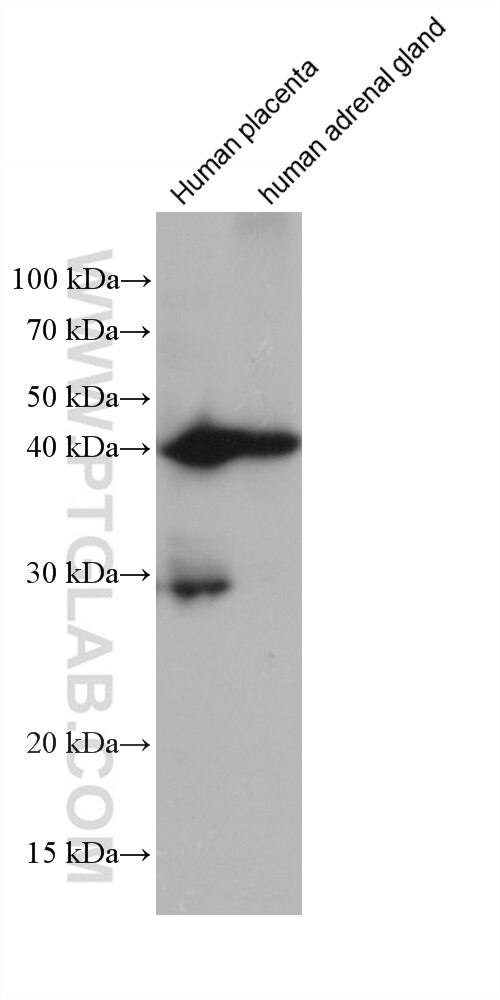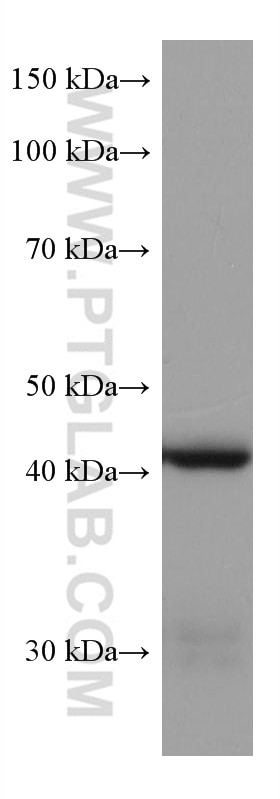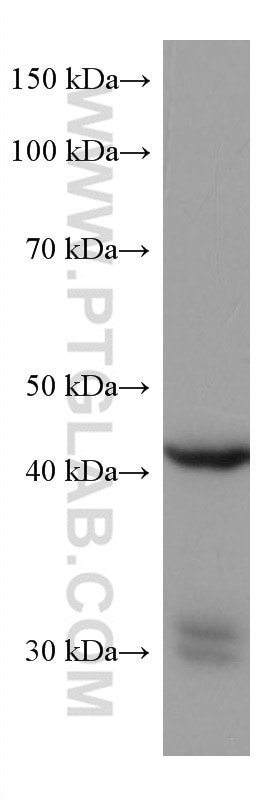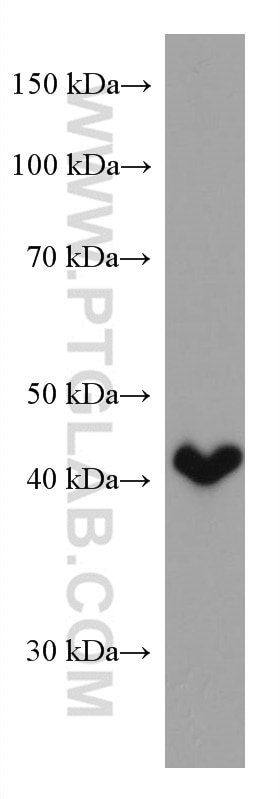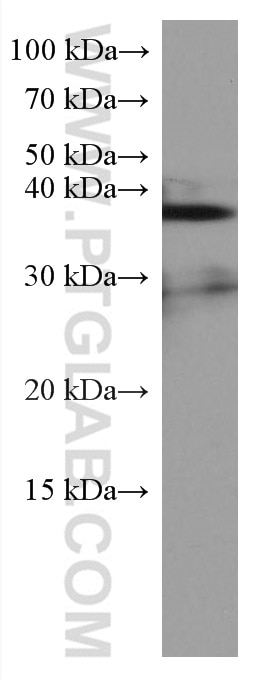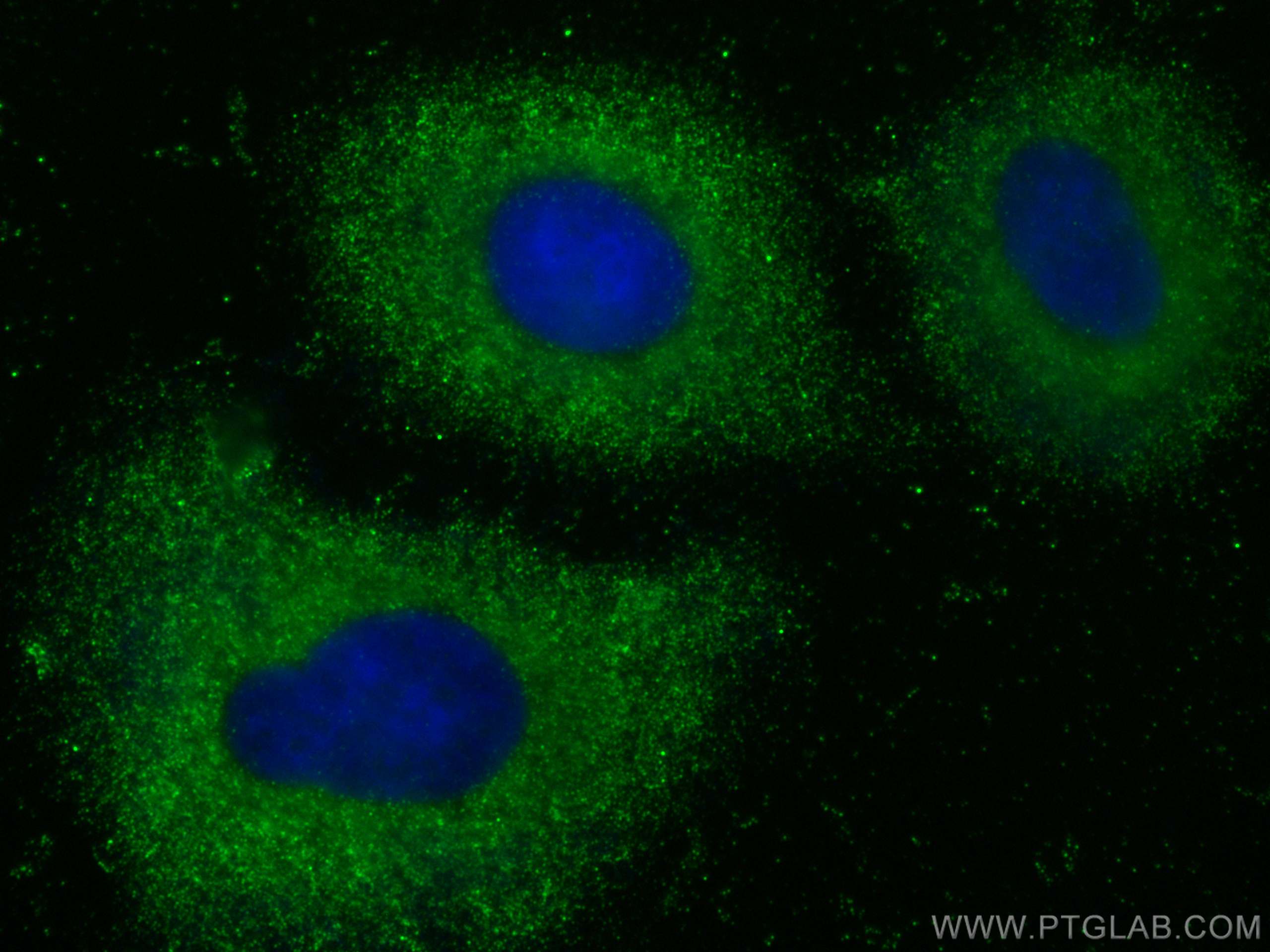Validation Data Gallery
Tested Applications
| Positive WB detected in | human placenta tissue, pig adrenal gland tissue, human adrenal gland tissue |
| Positive IF/ICC detected in | A549 cells |
Recommended dilution
| Application | Dilution |
|---|---|
| Western Blot (WB) | WB : 1:5000-1:50000 |
| Immunofluorescence (IF)/ICC | IF/ICC : 1:500-1:2000 |
| It is recommended that this reagent should be titrated in each testing system to obtain optimal results. | |
| Sample-dependent, Check data in validation data gallery. | |
Published Applications
| WB | See 5 publications below |
| IHC | See 2 publications below |
| IF | See 1 publications below |
Product Information
67572-1-Ig targets HSD3B2 in WB, IHC, IF/ICC, ELISA applications and shows reactivity with human, pig samples.
| Tested Reactivity | human, pig |
| Cited Reactivity | human, mouse |
| Host / Isotype | Mouse / IgG1 |
| Class | Monoclonal |
| Type | Antibody |
| Immunogen |
CatNo: Ag4291 Product name: Recombinant human HSD3B2 protein Source: e coli.-derived, PET28a Tag: 6*His Domain: 1-286 aa of BC038419 Sequence: MGWSCLVTGAGGLLGQRIVRLLVEEKELKEIRALDKAFRPELREEFSKLQNRTKLTVLEGDILDEPFLKRACQDVSVVIHTACIIDVFGVTHRESIMNVNVKGTQLLLEACVQASVPVFIYTSSIEVAGPNSYKEIIQNGHEEEPLENTWPTPYPYSKKLAEKAVLAANGWNLKNGDTLYTCALRPTYIYGEGGPFLSASINEALNNNGILSSVGKFSTVNPVYVGNVAWAHILALRALRDPKKAPSVRGQFYYISDDTPHQSYDNLNYILSKEFGLRLDSRWSLP 相同性解析による交差性が予測される生物種 |
| Full Name | hydroxy-delta-5-steroid dehydrogenase, 3 beta- and steroid delta-isomerase 2 |
| Calculated molecular weight | 42 kDa |
| Observed molecular weight | 42 kDa |
| GenBank accession number | BC038419 |
| Gene Symbol | HSD3B2 |
| Gene ID (NCBI) | 3284 |
| RRID | AB_2882785 |
| Conjugate | Unconjugated |
| Form | |
| Form | Liquid |
| Purification Method | Protein G purification |
| UNIPROT ID | P26439 |
| Storage Buffer | PBS with 0.02% sodium azide and 50% glycerol{{ptg:BufferTemp}}7.3 |
| Storage Conditions | Store at -20°C. Stable for one year after shipment. Aliquoting is unnecessary for -20oC storage. |
Background Information
HSD3B2(3-beta-hydroxy-Delta(5)-steroid dehydrogenase) belongs to the 3-beta-HSD family and catalyzes the oxidation and isomerization of delta-5-3-beta-hydroxysteroid precursors into delta-4-ketosteroids, thus leading to the formation of all classes of steroid hormones.HSD3B2 is expressed almost exclusively in adrenals and gonads, whereas HSD3B1 is expressed predominantly in the placenta and skin(PMID:1682237). Defects in HSD3B2 are the cause of adrenal hyperplasia type 2 (AH2).
Protocols
| Product Specific Protocols | |
|---|---|
| IF protocol for HSD3B2 antibody 67572-1-Ig | Download protocol |
| WB protocol for HSD3B2 antibody 67572-1-Ig | Download protocol |
| Standard Protocols | |
|---|---|
| Click here to view our Standard Protocols |
Publications
| Species | Application | Title |
|---|---|---|
Part Fibre Toxicol Chronic exposure to polystyrene microplastics induced male reproductive toxicity and decreased testosterone levels via the LH-mediated LHR/cAMP/PKA/StAR pathway. | ||
Ecotoxicol Environ Saf Biochemical mechanisms of tributyltin chloride-induced cell toxicity in Sertoli cells | ||
Birth Defects Res Bisphenol A decreases progesterone synthesis in human ovarian granulosa cells. | ||
Pathol Res Pract Disorganized adrenocortical zonational structure in COVID-19 patients: Implications of critical illness duration | ||
Front Endocrinol (Lausanne) Evaluation of 3β-hydroxysteroid dehydrogenase activity using progesterone and androgen receptors-mediated transactivation | ||
Metabolism Increased adrenal steroidogenesis and suppressed corticosteroid responsiveness in critical COVID-19 |

